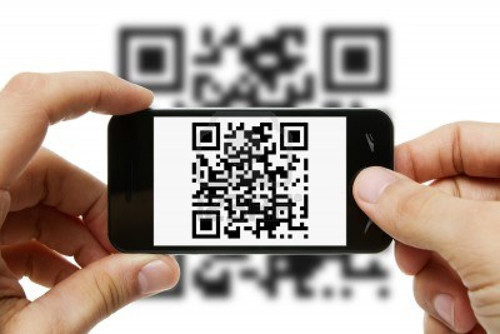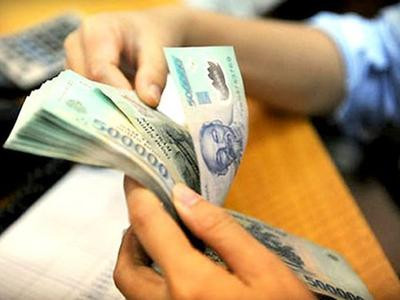Beggars also use QR codes, when cash is in short supply
Recently, when translating a passage from an article by Thomas Friedman, author of “The World is Flat”, and posting it on Facebook, telling the story of beggars in big Chinese cities “using” QR codes on begging bowls so that passersby can swipe their cards when they want to give money… many comments said that even Friedman was dazzled by the Chinese media about their technological development.
However, I believe that the goal of reducing cash usage will eventually become an inevitable trend for all civilized societies in the 21st century, not just Chinese society.
Vietnam, despite being a “startup nation”, is also aiming for about 90% of its population to be cashless by 2020. Policymakers believe this will quickly propel Vietnam to become one of the first countries to adopt digitalization in currency transactions worldwide, including Belgium, France and Canada.
» Only disburse cash for loans under 100 million VND
 |
| QR code |
In his nearly half-hour speech at the APEC Conference in Da Nang, the leader of the world's number 1 economy, US President Donald Trump repeatedly emphasized "fair and open trade", he mentioned the phenomena of inequality in world trade, including "currency speculation". One of the solutions to limit "currency speculation" is "minimizing cash transactions".
Indeed, as of September 2017, only one Asian country, South Korea, is in the top 10 countries that use the least cash.
The project to develop non-cash payments in Vietnam for the 2016-2020 period was approved by Prime Minister Nguyen Xuan Phuc with the goal of reducing the proportion of cash to total means of payment to less than 10% by the end of 2020.
Challenge
In fact, it is very difficult to achieve the above feat, because with a large population (95 million), but rural people account for 63.5% and income is still relatively low (6,400 USD/person in terms of purchasing power and about 2,200 USD in terms of exchange rate).
Economist Alan Phan once wrote: “I remember a famous IT tycoon also concluded that the number of mobile phone users in Vietnam has grown impressively by 36% per year in the past 5 years and reached 68 million people or about 80% of the population. The conclusion of this young expert is that Vietnam's IT future must be bright and will surpass countries like China, India, the Philippines... These are naive conclusions about the reality of society. A young person who spends all day hanging out at coffee shops or pubs will not contribute anything to creativity or dynamism, just like farmers with mobile phones will not change anything about the appearance of the countryside today” (e-book “Vietnam's Economy: A Different View”, page 16).
However, if people find it convenient, they will use it. For example: When Uber entered Vietnam nearly 3 years ago, many people thought that using this service would cost money, but now millions of people have used it, especially when Uber motorbikes were available. Here it is necessary to reiterate: Government agencies must give up the habit of intervening or defending group interests, which hinder the progress of development.
“Vietnam is moving towards becoming a cashless society”, it sounds dreamy, but with the 4.0 technology era, that miracle is not impossible to achieve. Moreover, this roadmap may be long, or very long, but importantly, it is carried out in parallel with other ways of using cash and is encouraged by the Government through policies that prioritize cashless use. For example, the way travel companies currently discount 10-20% for tourists who pay for their travel fees online.
Benefits for development
Some analysts say that currently 90% of transactions in Vietnam are based on cash and that has become a logistics nightmare: Printing money, transporting money, exchanging money, counting money... in large quantities when the conversion value of Vietnamese Dong is among the cheapest in the world (2017: Nearly 23,000 VND to 1 USD).
 |
| In the future, it is likely that cash will circulate less. Illustration photo |
Using cash naturally has some problems. Transporting cash is very expensive, it requires protection, cash is very unhygienic because it goes through many hands, indiscriminately, and is susceptible to corruption, bribery, illegal business, theft, or robbery, sometimes even causing disaster for those with money. Recently, the number of cash robberies at banks has increased significantly, to the point that PN News on September 28, 2017 ran a startling headline: "2017 - the year of daring bank robberies in Vietnam". The article wrote: "If before, bank robberies were very rare, then before the end of 2017, a series of bank robberies occurred, causing great panic among the public".
Furthermore, Vietnam is ranked “high” in the list of corrupt countries, so the Government must find every solution to help people, businesses and officials reduce or not use cash in financial transactions or payments.
I have heard many times when former President Truong Tan Sang, while in office, called on people and agencies, enterprises and companies to increase the use of bank accounts. He believed that it was also one of the tools to make money sources transparent.
Another important issue is that cash cannot grow wealth on its own. By keeping cash under your pillow instead of in a bank or non-bank institution, it will be “eroded” by inflation, which will cause the value of the money to decrease. Therefore, one possible financial solution is to put cash in circulation through financial instruments that can help the poorest people escape poverty. For example, giving pensioners the freedom to invest their money for profit.
Finally, in a country like Vietnam that is struggling to restructure its social welfare system while facing the challenge of an “aging population”, digital platforms or information technology are a good way to use public investment resources effectively and directly benefit the people.
Fear of virtual money
To achieve the target of up to 90% cashless transactions, innovative payment means will also be developed in rural areas, financial inclusion will become a top priority and at least 70% of those above 15 years of age will have a bank account by 2020.
Over the past 7 years, the number of bank accounts has increased impressively. Of course, the increase in the number of accounts does not mean that account holders do not use cash. But it is also the first tool to encourage people to use non-cash means such as credit cards, e-wallets, e-banking, momo, paypal...
Furthermore, with 254,000 digital points of sale deployed nationwide and with 38.3% of the adult population owning a smartphone, it shows that Vietnam already has the necessary infrastructure for cashless payments.
However, there are still many hurdles to overcome if the 2020 target is to be achieved. The most important of these is how to convince people who are used to using cash. In all types of transactions, whether business-to-business, customer-to-business or even business-to-government, cash is still the preferred method of transaction.
A prime example of this challenge is online payments, a feature that has been around for years. Despite its ease of use and obvious benefits over many manual payment processes, only 4.5 million people (or 18.47% of the population) have opted for this payment method to date.
Similarly, 90% of urban adults have at least one credit card, but only 15% of them use the card to pay in retail settings.
Ultimately, it comes down to trust. Despite the inherent risks of carrying cash, most people still see it as a “safer” option given what they know about online transactions. It’s actually a matter of habit, as many say: A physical bill still smells better than an invisible number online, even if it’s worth the same.
The fear of “virtual currency”, that is, psychology, is still a significant obstacle for the economy to become more transparent, healthier, and more civilized when “saying goodbye to cash./.
According to Tran Ngoc Chau/chinhphu.vn
| RELATED NEWS |
|---|

